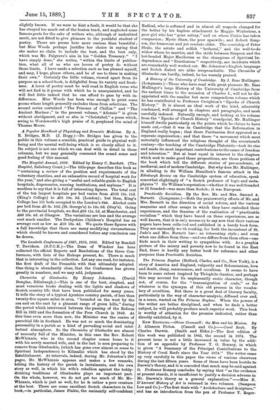Chronicles of Glenbuckie. By Henry Johnston. (David Douglas, Edinburgh.)—This is
one of the best, simplest, and most veracious books dealing with the lights and shadows of Scotch country life that have been published for many years. It tells the story of a typical Ayrshire country parish, of less than twenty-five square miles in area, "bounded on the west by the sea and on the east by a pleasant range of green hills," during the period which intervened between the passing of the Reform Bill in 1832 and the formation of the Free Church in 1843. At this time even more than now, the Minister was the centre of parochial life in Scotland. He was not so much the dominating personality in a parish as a kind of pervading social and intel- lectual atmosphere. So the Chronicles of Glenbuckie are almost of necessity full of the Minister, in this case the Rev. Robert McWhinnie, who in the second chapter comes home to it with his newly married wife, and in the last is seen preparing to remove from Glenbuckie, (which has gone over almost en masse to Spiritual Independence) to Vilma:Me which has stood by the Establishment. At intervals, indeed, during Mr. Johnston's 290 pages, Mr. McWhinnie appears and makes a few remarks, telling the history of the parish in instalments, and his own
story as well, in which his wife's rebellion against the toddy- drinking traditions of Glenbuckie plays an important part.
On the whole, however, we do not get too much of Mr. Mc- Whinnie, which is just as well, for he hi rather a poor creature at the best. There are some excellent Scotch characters in the book,—in particular, James Pinkie, the eminently self-confident Radical, who is softened and in almost all respects changed for the better by his hapless attachment to Maggie Winlestrae, a poor girl who has "gone astray," and on whom Pinkie has taken compassion ; Mysie Shaw, the poor spaewife ; and Robert Simp- son, the humorous and yet resolute elder. The courtship of Peter Shule, the astute and selfish " betheral," and the well-to-do Widow whom he marries, and the strife between Simpson and the hot-headed Major Macilorum as the champions of Spiritual In- dependence and " Erastianism " respectively, are incidents which are remarkably well worked out. Mr. Johnston's English language and Scotch dialect are alike irreproachable. The Chronicles of Glenbuckie can hardly, indeed, be too warmly praised.


































 Previous page
Previous page